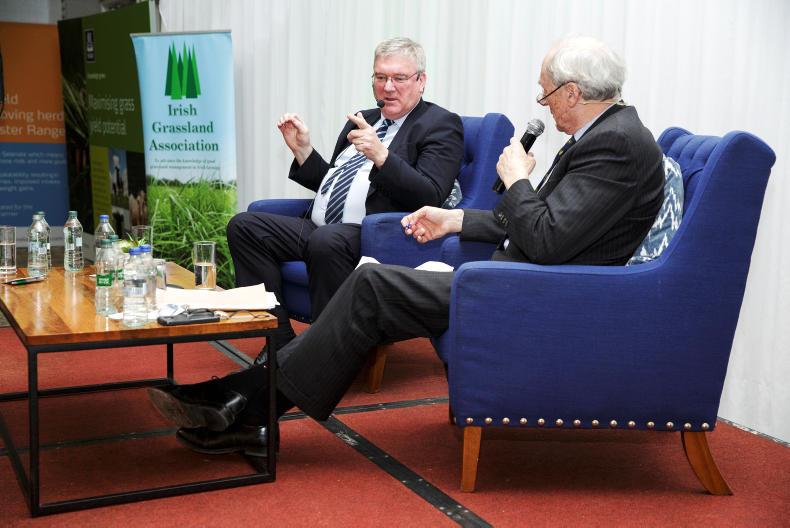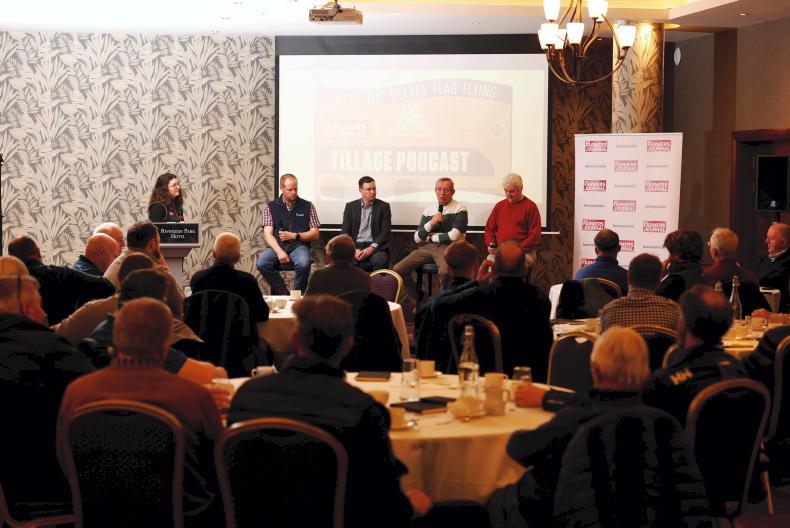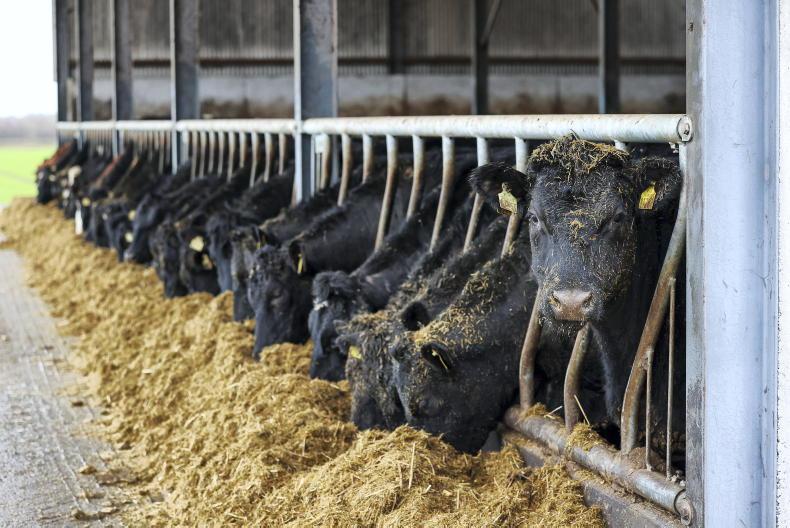A career in the food industry was perhaps an inevitability for May Wong. Growing up in Stranorlar near Ballybofey in Co Donegal with a Chinese father and a mother from Athlone, her family run three Chinese restaurants in the county.
Fast forward a quarter of a century and May is working for Bord Bia promoting Irish products in South East Asia from her base in Singapore, taking up her new role as trade market specialist at the turn of the year. But how did this extraordinary mix of culture and chance come to be?
“It all started when my father moved to Ireland and was an apprentice chef in a Chinese restaurant in Longford town during the late 1980s. My mother is originally from Athlone but moved to Longford town during her teens and that is where they met. I think it was the love letters in spring rolls that got them together,” she laughs.
Early years
Growing up in Donegal had its challenges for May.
“It would have been quite difficult for me growing up. I have found myself in a lot of confrontational situations because of the way I look and because of my last name. I used to think that if I was brought up with my mother’s maiden name it would have been very different because I wouldn’t be judged so quickly by my Asian name.
“After I went to college in Dublin and I found people who had similar experiences, my perception of those experiences changed and I felt more at home. We were the only Chinese family in Stranorlar at that time. When I reached 15 years old, the town became slightly more diverse as there were Indian, Polish and Lithuanian families living there. It was often tough to make new friends because sometimes people who wouldn’t know you would judge you straight off the bat.
“The first time I was bullied was when I was five. My mother had me taken off the school bus and she walked me to school until I was 12 and when I got back on the bus I was bullied again and I had to walk again until I finished up in secondary school.
“It has made me a much stronger character. I am not so sensitive to those kind of comments anymore and I have become a lot more open minded to other people’s struggles due to my experiences. I have experienced prejudice being Chinese in a small rural town, so I felt like I wanted to go and see China to understand my heritage and that drove me to learn Mandarin Chinese.
“My grandmother is from Hong Kong and she doesn’t speak English, so trying to learn a common language that I can speak with her was important to me. So these experiences impacted me in such a way that exploring the other side of my ethnicity became very important to me and that is why I went to China.”

May Wong. \ Ore Huiying
The path to Bord Bia
May had an early introduction to the food industry. The early ’90s saw her parents marry and move to Donegal, where they opened the first of their three Chinese restaurants. May remembers from an early age helping out at the restaurants, waitressing and chatting with customers.
It’s not a surprise then that she developed an interest in business, going on to study commerce and Chinese in UCD before moving to China in 2014.
“I did a post-graduate scholarship in Tsinghua University to study the Chinese language to become fluent,” said May. “I then went to work in an international education company in China for a year before working in international property investment.”
Working and residing in China for two years, May became involved with the Irish community in Beijing.
“I was heavily involved in the Irish Chamber of Commerce in Beijing and Beijing GAA. We organised large events such as gala dinners for up to 800 attendees or yearly China Gaelic games. I found it very difficult to get Irish products in China. You can find Baileys, Guinness and Kerrygold butter, but as far as any other Irish products are concerned, they were non-existent For me, my passion was about growing these products in Asian markets.
“I was interested in putting more Irish brands on the Chinese shelves. I applied for the Chinese position, but the Singapore opportunity just came up. It was the first time there was a Bord Bia fellow in the country, so it was a big opportunity to grow Irish brands in the market because there is an Irish presence there now,” May said.
The Bord Bia fellowship
The Bord Bia fellowship programme is 18 months long and participants complete a part-time master’s in UCD’s Michael Smurfit Graduate Business School and are assigned three to four companies to work with in a particular market.
“As part of the fellowship, you are typically assigned one major and two standard companies to work with. Pan Euro Foods was my major company and McBride Fishing and Silver Hill Duck were my standard companies. Typically you’d spend 20 hours a week focusing on the major project and 10 hours a week on both of the standard projects. You work for them in a sales, marketing or a research capacity. All my projects would vary between market research, business development, consumer marketing and brand ambassador roles,” May explains.
“My nine-to-five changes every day. You could be attending duck tastings, blind tastings in a restaurant, trilingual client presentations, meeting buyers and retailers or undertaking market research projects.
“Another large portion of my time involved building itineraries for client companies that were visiting, as well as exhibiting at trade exhibitions, so really it depended on the time of the year, but overall it was extremely varied.”

May Wong. \ Ore Huiying
Challenges
“The biggest challenges I faced were driving projects across the line. I was looking after eight countries with all the various clients in Asia, which consists of Singapore, Malaysia, Vietnam, Thailand, Indonesia, Philippines, Japan and Korea, so I have covered and visited all of those countries in the last 18 months.
“Getting projects over the line can be difficult because you are not in market all the time, you don’t understand the culture and you don’t understand the local language.
“Culturally in a lot of these places, it takes a long time to build a relationship in order to build long-term partnerships. Some companies want to go there and get the quick sale but it is not that easy, there is a lot of hard work and relationship building needed before you can do that.”
Travel
“In the past month I have been to nine cities,” May explains.
An obvious subsequent question was: Is it all work or can one enjoy themselves?
“It depends really,” replies May. “It has been very crammed this past month because it is coming to the end of the programme and everybody wants your time before you finish up.
“Once you close off sales, generally you would try and pencil in a few of the days at the end if you have time to stay. If you work five days, 9am to 9pm, then it is important for you to stay on a few days, relax and get some down time because a lot of your days are quite intensive.
“You definitely get a real-life experience while travelling for work in Asia, like going on the back of a motor bike with someone who doesn’t speak English to get to a buyer meeting because taxis are not an option due to the likelihood someone is going to scam you or traffic is too bad,” she says.
On 14 January, May takes up a post as a trade market specialist in Bord Bia in Singapore. In her new role she will look after six countries with the Bord Bia director of South East Asia, a job which will see her look after a broad range of categories.
May’s story is as extraordinary as it is different. Growing up in the Irish food industry may have had an Asian twist, but it was one that suited her greatly in her future career.
A career in the food industry was perhaps an inevitability for May Wong. Growing up in Stranorlar near Ballybofey in Co Donegal with a Chinese father and a mother from Athlone, her family run three Chinese restaurants in the county.
Fast forward a quarter of a century and May is working for Bord Bia promoting Irish products in South East Asia from her base in Singapore, taking up her new role as trade market specialist at the turn of the year. But how did this extraordinary mix of culture and chance come to be?
“It all started when my father moved to Ireland and was an apprentice chef in a Chinese restaurant in Longford town during the late 1980s. My mother is originally from Athlone but moved to Longford town during her teens and that is where they met. I think it was the love letters in spring rolls that got them together,” she laughs.
Early years
Growing up in Donegal had its challenges for May.
“It would have been quite difficult for me growing up. I have found myself in a lot of confrontational situations because of the way I look and because of my last name. I used to think that if I was brought up with my mother’s maiden name it would have been very different because I wouldn’t be judged so quickly by my Asian name.
“After I went to college in Dublin and I found people who had similar experiences, my perception of those experiences changed and I felt more at home. We were the only Chinese family in Stranorlar at that time. When I reached 15 years old, the town became slightly more diverse as there were Indian, Polish and Lithuanian families living there. It was often tough to make new friends because sometimes people who wouldn’t know you would judge you straight off the bat.
“The first time I was bullied was when I was five. My mother had me taken off the school bus and she walked me to school until I was 12 and when I got back on the bus I was bullied again and I had to walk again until I finished up in secondary school.
“It has made me a much stronger character. I am not so sensitive to those kind of comments anymore and I have become a lot more open minded to other people’s struggles due to my experiences. I have experienced prejudice being Chinese in a small rural town, so I felt like I wanted to go and see China to understand my heritage and that drove me to learn Mandarin Chinese.
“My grandmother is from Hong Kong and she doesn’t speak English, so trying to learn a common language that I can speak with her was important to me. So these experiences impacted me in such a way that exploring the other side of my ethnicity became very important to me and that is why I went to China.”

May Wong. \ Ore Huiying
The path to Bord Bia
May had an early introduction to the food industry. The early ’90s saw her parents marry and move to Donegal, where they opened the first of their three Chinese restaurants. May remembers from an early age helping out at the restaurants, waitressing and chatting with customers.
It’s not a surprise then that she developed an interest in business, going on to study commerce and Chinese in UCD before moving to China in 2014.
“I did a post-graduate scholarship in Tsinghua University to study the Chinese language to become fluent,” said May. “I then went to work in an international education company in China for a year before working in international property investment.”
Working and residing in China for two years, May became involved with the Irish community in Beijing.
“I was heavily involved in the Irish Chamber of Commerce in Beijing and Beijing GAA. We organised large events such as gala dinners for up to 800 attendees or yearly China Gaelic games. I found it very difficult to get Irish products in China. You can find Baileys, Guinness and Kerrygold butter, but as far as any other Irish products are concerned, they were non-existent For me, my passion was about growing these products in Asian markets.
“I was interested in putting more Irish brands on the Chinese shelves. I applied for the Chinese position, but the Singapore opportunity just came up. It was the first time there was a Bord Bia fellow in the country, so it was a big opportunity to grow Irish brands in the market because there is an Irish presence there now,” May said.
The Bord Bia fellowship
The Bord Bia fellowship programme is 18 months long and participants complete a part-time master’s in UCD’s Michael Smurfit Graduate Business School and are assigned three to four companies to work with in a particular market.
“As part of the fellowship, you are typically assigned one major and two standard companies to work with. Pan Euro Foods was my major company and McBride Fishing and Silver Hill Duck were my standard companies. Typically you’d spend 20 hours a week focusing on the major project and 10 hours a week on both of the standard projects. You work for them in a sales, marketing or a research capacity. All my projects would vary between market research, business development, consumer marketing and brand ambassador roles,” May explains.
“My nine-to-five changes every day. You could be attending duck tastings, blind tastings in a restaurant, trilingual client presentations, meeting buyers and retailers or undertaking market research projects.
“Another large portion of my time involved building itineraries for client companies that were visiting, as well as exhibiting at trade exhibitions, so really it depended on the time of the year, but overall it was extremely varied.”

May Wong. \ Ore Huiying
Challenges
“The biggest challenges I faced were driving projects across the line. I was looking after eight countries with all the various clients in Asia, which consists of Singapore, Malaysia, Vietnam, Thailand, Indonesia, Philippines, Japan and Korea, so I have covered and visited all of those countries in the last 18 months.
“Getting projects over the line can be difficult because you are not in market all the time, you don’t understand the culture and you don’t understand the local language.
“Culturally in a lot of these places, it takes a long time to build a relationship in order to build long-term partnerships. Some companies want to go there and get the quick sale but it is not that easy, there is a lot of hard work and relationship building needed before you can do that.”
Travel
“In the past month I have been to nine cities,” May explains.
An obvious subsequent question was: Is it all work or can one enjoy themselves?
“It depends really,” replies May. “It has been very crammed this past month because it is coming to the end of the programme and everybody wants your time before you finish up.
“Once you close off sales, generally you would try and pencil in a few of the days at the end if you have time to stay. If you work five days, 9am to 9pm, then it is important for you to stay on a few days, relax and get some down time because a lot of your days are quite intensive.
“You definitely get a real-life experience while travelling for work in Asia, like going on the back of a motor bike with someone who doesn’t speak English to get to a buyer meeting because taxis are not an option due to the likelihood someone is going to scam you or traffic is too bad,” she says.
On 14 January, May takes up a post as a trade market specialist in Bord Bia in Singapore. In her new role she will look after six countries with the Bord Bia director of South East Asia, a job which will see her look after a broad range of categories.
May’s story is as extraordinary as it is different. Growing up in the Irish food industry may have had an Asian twist, but it was one that suited her greatly in her future career.










SHARING OPTIONS